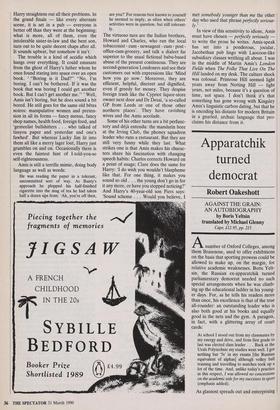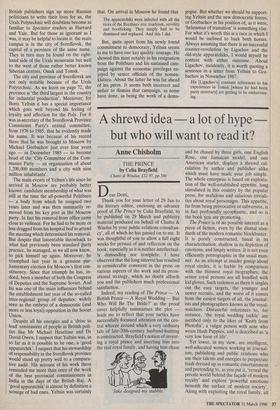Apparatchik turned democrat
Robert Oakeshott
AGAINST THE GRAIN: AN AUTOBIOGRAPHY by Boris Yeltsin translated by Michael Glenny
Cape, f12.95, pp. 215
Anumber of Oxford Colleges, among them Brasenose, used to offer exhibitions on the basis that sporting prowess could be allowed to make up, on the margin, for relative academic weaknesses. Boris Yelt- sin, the Russian ex-apparatchik turned parliamentary democrat needed no such special arrangements when he was climb- ing up the educational ladder in his young- er days. For, as he tells his readers more than once, his excellence is that of the true all-rounder: an outstanding leader who is also both good at his books and equally good in the nets and the gym. A paragon, in fact, with a glittering array of court cards: At school I stood out from my classmates by my energy and drive, and from first grade to last was elected class leader . . . Back at the Urals Polytechnic my studies went well. I got nothing but `Ss' in my exams [the Russian equivalent of alphas] although volley ball training and travelling to matches took up a lot of the time. And, unlike today's practice in this respect, I was allowed no concessions on the academic side for my successes in sport (emphasis added).
As glasnost spreads out and enterprising British publishers sign up more Russian politicians to write their lives for us, the Urals Polytechnic will doubtless become as familiar to Spectator readers as Harvard and Yale. But for those as ignorant as I was, it may be helpful to locate it: the main campus is in the city of Sverdlovsk, the capital of a province of the same name. They in turn may be found on the right- hand side of the Urals mountains but well to the west of those rather better known Siberian centres, Omsk and Tomsk.
The city and province of Sverdlovsk are not only notable because of the Urals Polytechnic. As we learn on page 72, the province is 'the third largest in the country for industrial production'. Moreover, for Boris Yeltsin it has a special importance which goes well beyond his feeling of loyalty and affection for the Poly. For it was as secretary of the Sverdlovsk Province Communist Party's central committee, from 1976 to 1985, that he evidently made his name. It was because of his record there that he was brought to Moscow by Michael Gorbachov just over four years ago — in December 1985 — to become head of the 'City Committee of the Com- munist Party — an organisation of about 1,200,000 members and a city with nine million inhabitants'.
The main events of Yeltsin's life since he arrived in Moscow are probably better known: candidate membership of what was still at the time the all-powerful Politburo — a body from which he resigned two years later and was then summarily re- moved from his key post in the Moscow party. In fact his removal from office came close to violence. For he had to be more or less dragged from his hospital bed to attend the meeting which determined his removal. But despite that lamentable throwback to what had previously been standard party practice, he managed, as we all now know, to pick himself up again. Moreover, he triumphed last year in a genuine par- liamentary election for Moscow's first con- stituency. Since that triumph he has, in- deed, been a member of both the Congress of Deputies and the Supreme Soviet. And his was one of the main influences behind the establishment last year of the so-called inter-regional group of deputies: widely seen as the embryo of a democratic (and more or less loyal) opposition in the Soviet Union.
Despite all his energies and a 'drive to lead' reminiscent of people in British poli- tics like Mr Michael Heseltine and Dr David Owen, I suspect that Yeltsin was, in so far as it is possible to be one, a 'good apparatchik'. I suspect that his stewardship of responsibility in the Sverdlovsk province would stand up pretty well to a compara- tive audit. His account of his work there reminded me more than once of the work of the best provincial commissioners in India in the days of the British Raj. A `good apparatchik' is almost by definition a scourge of bad ones. Yeltsin was certainly that. On arrival in Moscow he found that
The apparatchiki were infected with all the vices of the Brezhnev era: toadyism, servility and bootlicking. They simply had to be dismissed and replaced. And this I did.
But, quite apart from his newly found commitment to democracy, Yeltsin seems to me to have one key quality: courage. He showed this most notably in his resignation from the Politburo and his sustained cam- paign against the economic privileges en- joyed by senior officials of the nomen- klatura. About the latter he was far ahead of his peers. It seems both incorrect and unfair to dismiss that campaign, as some have done, as being the work of a dema- gogue. But whether we should be support- ing Yeltsin and the new democratic forces, or Gorbachov in his position of, as it were, `helmsman of transition' is something else. For what it's worth this is a race in which I would be inclined to back both horses. Always assuming that there is no successful counter-revolution by Ligachov and the old-style apparatchiks, I would myself be content with either outcome. About Ligachov, incidently, it is worth quoting a sentence in a letter from Yeltsin to Gor- bachov in November 1987:
His [Ligachov's] constant references to his experiences in Tomsk [where he had been party secretary] are getting to be embarrass- ing.



























































 Previous page
Previous page